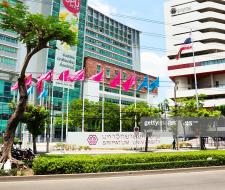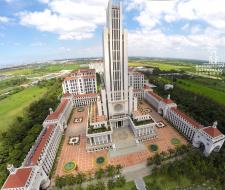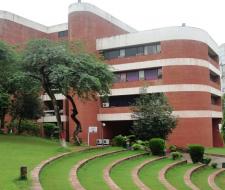6 best English universities in Thailand
-
 from 3800.00 $ / year
from 3800.00 $ / year -
 from 2025.00 € / year
from 2025.00 € / year -
 from 425.00 € / semester
from 425.00 € / semester -

-
 from 1545.00 $ / semester
from 1545.00 $ / semester -
 from 7900.00 $ / year
from 7900.00 $ / year
Thailand , with its rich cultural heritage and nature, is becoming an increasingly attractive destination for students wishing to receive a quality education in an international environment. While Thai is the main language of instruction in the country, there are top universities offering English-language programs that are very popular among foreign students, including students from Russia and the CIS countries.
Explore English Universities in Thailand Offering Global Perspectives and also Top US Universities for a Comprehensive View of International Higher Education.
Alternative destinations
Characteristics of Top English Universities in Thailand
English-language programs at these universities typically employ a blended approach, including lectures, seminars, group projects, practical sessions, and independent research. Teaching methods are interactive, with an emphasis on stimulating active student participation.
Depending on the course and program requirements, students may have between 15 to 20 hours of classes per week, including laboratory work.
These courses attract students from around the world, creating a multicultural and international educational environment. This provides the opportunity to interact with peers from different cultures and countries, enriching the experience and allowing for the development of skills to work in a global setting.
English-language programs at these universities often have an academic focus in specific fields, with the most popular being business, engineering, science, arts, and humanities.
Students in English-language programs have access to well-established academic resources at the university, including libraries, laboratories, computer facilities, and modern classrooms.
Types of English Universities in Thailand
-
Autonomous Universities: These universities continue to receive state funding, but in a reduced capacity compared to when they were fully state-funded institutions.
-
State Universities
-
Rajabhat Universities: These are regional universities primarily focused on community development, and in the modern world, they also cater to international students. They were originally established as teacher training colleges and were upgraded to comprehensive universities in 2004.
-
Rajamangala University of Technology (RMUT): These universities place a strong emphasis on technology and technical fields as they were initially established as polytechnic colleges before attaining university status in 2005.
-
Private Universities
-
Branch Campuses of International Universities.
Programs of Study at Top English Universities in Thailand
Bachelor's Degree
Bachelor's programs in Thailand typically have a duration of 3 to 4 years, depending on the chosen major and university. Each academic year is divided into semesters or trimesters, and students must complete the required number of semesters (usually 6-8) to earn a bachelor's degree.
Bachelor's programs in Thailand are based on a credit system, where each course has a specific number of credits and hours. Typically, one credit corresponds to approximately 15-16 hours of instruction, including lectures, seminars, practical sessions, and independent work. The total number of credits required to complete a program is around 120-140.
Bachelor's programs in Thailand offer a variety of subjects and specializations in different fields, including humanities, social sciences, natural sciences, engineering, business, and information technology.
During their bachelor's studies, students may participate in projects, practical sessions, and internships related to their specialization. This allows them to apply their acquired knowledge in practice, develop skills, and gain industry experience.
Some English universities in Thailand (especially international ones) also offer interdisciplinary bachelor's programs that allow students to combine subjects from different fields of knowledge, providing them with a broader range of competencies and preparing them for work in a modern, multidisciplinary environment.
Master's Degree
Master's programs in Thailand typically last from 1 to 2 years. One credit usually corresponds to approximately 15-16 hours of instruction, and the total number of credits required to complete a program ranges from 36 to 48.
Master's programs in Thailand include research work, internships, and projects related to the chosen field.
Many master's programs in English in Thailand require the writing of a master's thesis, which is a research project where students delve into a specific problem or topic in their field of specialization. The master's thesis is an integral part of the master's program and demands independent research and analysis.
Doctoral Degree
A doctoral degree in Thailand represents the highest level of research-based education. Doctoral programs in Thailand usually last from 3 to 5 years (sometimes up to 6-7 years in medical fields). Doctoral candidates spend most of their time conducting research and working on their dissertation.
Doctoral students work under the guidance of a research advisor, conducting original research in their area of specialization. The goal of the research is to make a new contribution to scientific knowledge.
During their doctoral studies, students may participate in seminars, courses, and events organized by the university or research groups.
Cost of Education in Thailand
Education in Thai state universities is affordable for both Thai citizens and residents. The cost can range from 20,000 to 50,000 Thai Baht per year (approximately $600-$1,500). This is tuition fees only and does not include expenses for accommodation, meals, and textbooks. For foreigners, the cost will be approximately double.
Private universities in Thailand have higher tuition fees compared to public institutions. The cost can vary from 50,000 to 200,000 Thai Baht per year (approximately $1,500-$6,000, sometimes reaching $10,000-$12,000). Similar to state universities, this covers tuition fees alone and does not account for additional expenses such as housing or residence fees.
The cost of education in international programs offered by English-language universities in Thailand is even higher. Here, tuition fees can range from 100,000 to 400,000 Thai Baht per year (approximately $3,000-$12,000, sometimes reaching $17,000-$19,000). Some international programs may also require an admission fee or other additional charges.
Admission Requirements
Since 2018, Thailand has been using the Thai Central Admission System (TCAS) for undergraduate admissions, but some state universities and private institutions have their own admission systems. TCAS comprises five different admission rounds, including:
-
Portfolio Round (student transcript)
-
Quota Round
-
Direct Admission
-
Central Examination Round
-
Individual Faculty Admission for available seats
The goal of TCAS is to promote educational equality among students from different socioeconomic backgrounds by minimizing transportation costs and examination fees for students from underprivileged families.
The documents required for admission to Thai universities may vary slightly depending on the university and the chosen program. A typical list includes:
-
Completed and signed application form, usually provided by the university.
-
Copy of the passport page with personal information and photo.
-
Copies of official academic documents, including high school diplomas or higher education degrees (translation into English and official verification may be required).
-
Copy of the official transcript of grades from previous educational institutions, along with a translation.
-
Recommendation letters from teachers, professors, or professionals who can vouch for your academic abilities and potential.
-
Standardized test results, such as SAT or ACT, and language proficiency certificates like TOEFL or IELTS.
-
A document outlining your academic and professional history, achievements, and involvement in extracurricular activities.
-
Passport-sized photographs.
Top 14 best universities in Switzerland 2026
| 1 | Glion Institute of Higher Education Switzerland |
| 2 | Les Roches International School Montana |
| 3 | César Ritz Colleges Switzerland |
| 4 | IHTTI School of Hotel Management |
| 5 | Ecole Hoteliere de Lausanne |
| 6 | Geneva Business School |
| 7 | HIM Hotel Institute Montreux |
| 8 | Swiss Hotel Management School |
| 9 | Webster University Geneva |
| 10 | Business and Hotel Management School |
| 11 | Luzern IMI |
| 12 | Swiss Hotel Management School (SHMS) Caux |
| 13 | International University in Geneva |
| 14 | Culinary Arts Academy Switzerland |
Top 10 best universities in Netherlands 2026
Top 35 best universities and colleges in Canada 2026
| 1 | University of Toronto |
| 2 | McGill University |
| 3 | University of British Columbia |
| 4 | University of Alberta |
| 5 | Simon Fraser University |
| 6 | Montreal University |
| 7 | University of Windsor |
| 8 | York University |
| 9 | University of Guelph |
| 10 | McMaster University |
| 11 | University of Manitoba |
| 12 | University of Waterloo |
| 13 | Royal Roads University |
| 14 | Vancouver Film School |
| 15 | Kwantlen Polytechnic University |
| 16 | University of Calgary |
| 17 | Dalhousie University |
| 18 | Fanshawe College |
| 19 | University of Ottawa |
| 20 | Laval University |
| 21 | Sheridan College |
| 22 | University of Regina |
| 23 | Brock University |
| 24 | Thompson Rivers University |
| 25 | Humber College |
| 26 | Vancouver Island University |
| 27 | Mohawk College |
| 28 | Centennial College Toronto |
| 29 | Niagara College |
| 30 | Capilano University |
| 31 | Seneca College |
| 32 | Algoma University |
| 33 | Saint Clair College |
| 34 | Douglas College |
| 35 | LaSalle College |
